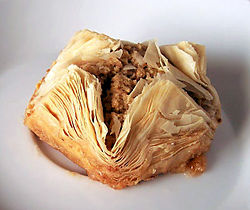The topic of this article may not meet Wikipedia's general notability guideline .(May 2025) |
The Greek Food Festival is a festival held in mid-October in Tallahassee, Florida, United States and hosted by the Holy Mother of God Greek Orthodox Church.
The topic of this article may not meet Wikipedia's general notability guideline .(May 2025) |
The Greek Food Festival is a festival held in mid-October in Tallahassee, Florida, United States and hosted by the Holy Mother of God Greek Orthodox Church.
As in many Greek festivals in the U.S., this festival is part of Tallahassee's diversity of cultures. The goal is to give the community a taste of Greek food, Greek music, Greek culture, Greek dancing, and entertainment. At Greek Festivals you will typically find Greek gourmet food, Greek folk music — usually performed by Greek bands, cultural exhibitions including artifacts from Greece and dances performed in costumes of old tradition, and dancing for the public under Greek tunes. It is a community-building event for the parish.

Traditional Greek foods like spanakopita, tzatziki, baklava, dolmades, tsoureki, skordalia, melitzanosalata, melomakarona, kakavia soup, kourabiedes, kothropita, and kapamas are made.